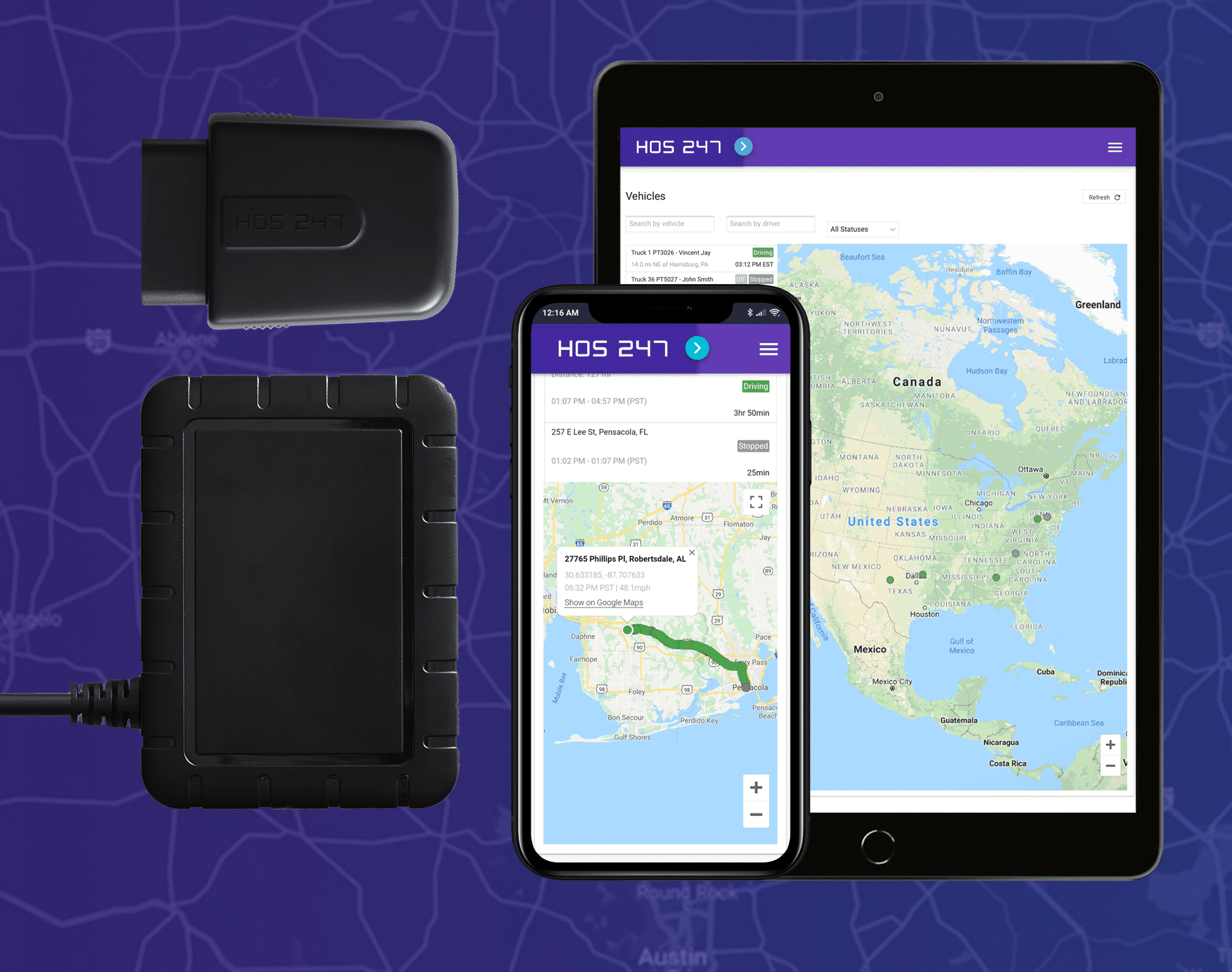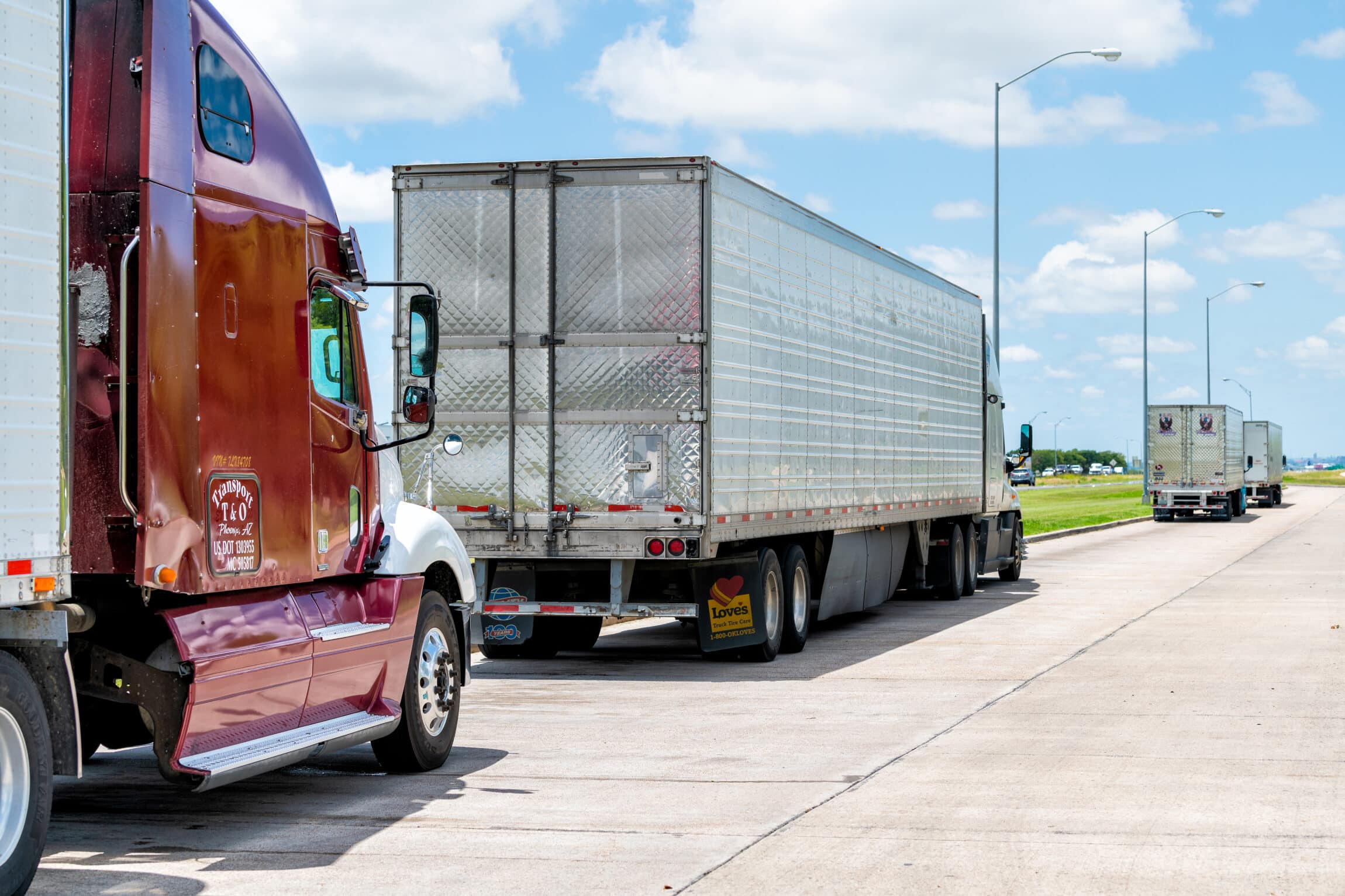Effective management of a commercial vehicle fleet is a complex and demanding task that requires a high level of attention to detail. Fortunately, the emergence of monitoring systems has greatly simplified this process. These advanced digital platforms provide real-time visibility into vehicle performance and compliance, enabling managers to effortlessly track, monitor, and manage critical data about their commercial vehicles to support their decision making process. Fleet management tools have transformed the way businesses manage their vehicles. In this article, we will delve deeper into fleet monitoring and examine the multitude of benefits it can provide for businesses of all sizes.
Do you have any questions? Talk to ELD Advisor: 650-405-3372 or Request Callback
What Is Fleet Monitoring?
Fleet monitoring is a comprehensive technology-driven approach that uses real-time data collection and analysis to track, manage, and optimize commercial vehicle operations.
In the trucking industry, the terms fleet monitoring, fleet management, and fleet tracking are commonly used interchangeably, though they can have slightly different emphasis:
- Fleet monitoring. Generally focuses on real-time observation and data collection.
- Fleet management. Often encompasses broader operational strategies and workflows.
- Fleet tracking. Typically emphasizes location monitoring and vehicle positioning.
Fleet monitoring relies on telematics technology, which combines telecommunications and vehicle informatics to transmit critical data from vehicles to centralized management systems. GPS technology serves as the backbone, providing precise location coordinates for real-time positioning and route analysis.
Modern fleet monitoring systems integrate three essential elements:
- GPS fleet tracking. Accurate location data and route monitoring capabilities.
- Vehicle diagnostics. Engine health monitoring and performance metrics analysis.
- Driver behavior monitoring. Analysis of driving patterns including speeding, harsh braking, and acceleration habits.
Fleet monitoring has evolved dramatically since GPS became available for civilian use. Early systems offered only basic location tracking, while today’s platforms feature artificial intelligence, predictive analytics, and machine learning. Modern systems can predict maintenance needs before breakdowns occur, automatically detect safety violations, and optimize routes based on real-time conditions.

Advantages of Using a Fleet Vehicle Monitoring System
Deploying a fleet tracking technology system can offer numerous benefits to businesses that rely on commercial vehicles to operate. From reduced fuel and maintenance costs to simplified regulatory compliance and improved fleet and driver safety, fleet tracking can revolutionize the way a company manages its vehicles. Let’s explore some of the key advantages of using a fleet vehicle monitoring system:
- Reduced costs and maintenance. Businesses can significantly reduce fuel wastage and maintenance costs through the use of digital tools, such as idle reporting and vehicle diagnostics. These features enable efficient monitoring and analysis of vehicle performance, helping identify and address issues such as excessive idling and potential maintenance requirements, ultimately resulting in significant cost savings for the company.
- Simplified regulatory compliance. When integrated with an ELD, GPS tracking technology can help businesses comply with strict regulations around drivers’ hours of service, electronic logging, fuel tax reporting, and vehicle performance. By staying up-to-date with these regulations, motor carriers can prevent noncompliance issues that could result in penalties or fines.
- Improved fleet and driver safety. Fleet GPS monitoring solutions can analyze various aspects of driver behavior, including speeding. Enhanced with real-time GPS tracking, the system informs fleet managers if a vehicle is involved in an accident or taken to an unauthorized location, helping to locate the vehicle in case of theft. This information is accessed through a web-based portal.
- Enhanced customer service. Fleet monitoring platforms facilitate coordination between drivers and operations managers, ensuring everyone is on the same page. With constant visibility into the fleet’s movement, businesses can provide better customer service, resulting in increased satisfaction.
- Reduced insurance and maintenance costs. Fleet tracking devices can help motor carriers lower their insurance and maintenance costs by preventing accidents and ensuring that vehicles are properly maintained so they perform optimally.
- Increased productivity. With real-time visibility into operational and historical fleet data, fleet managers can identify opportunities to increase profitability and overall productivity while minimizing risks and efficiency gaps.
These advantages show how fleet vehicle monitoring systems have become essential tools for trucking operations. With the right monitoring solution, businesses can achieve great improvements in operational efficiency while reducing costs.

Fleet Monitoring Solutions by Fleet Type
Fleet monitoring systems must adapt to the unique operational demands of different trucking operations. Understanding these distinctions helps fleet managers select solutions that address their specific challenges and maximize return on investment.
Long-Haul Operations
Long-haul trucking fleets require robust monitoring capabilities that track vehicles across multiple states and time zones. These operations benefit from comprehensive HOS compliance tracking, fuel efficiency monitoring over extended routes, and maintenance scheduling that accounts for high-mileage operations. IFTA reporting becomes essential for interstate commerce, while driver fatigue monitoring helps ensure safety during extended trips.
Local Delivery Operations
Local delivery fleets focus on maximizing efficiency within concentrated geographic areas. These operations prioritize route optimization, stop-time monitoring, and customer notification systems. Geofencing capabilities help track arrival and departure times at multiple delivery locations, while idle time monitoring becomes crucial for operations with frequent stops and urban driving conditions.
Mixed Fleet Operations
Mixed fleet operations present unique monitoring challenges, requiring systems that can accommodate both long-haul and local delivery vehicles within a single platform. Flexible reporting capabilities allow managers to analyze different operational metrics for each fleet segment while maintaining unified oversight of the entire operation.
Enterprise vs. Owner-Operator Needs
The monitoring needs differ significantly between owner-operators and large fleets. Owner-operators typically prioritize cost-effective solutions with essential features like basic GPS tracking, HOS compliance, and fuel monitoring. Large fleets require sophisticated analytics, driver performance benchmarking, and advanced reporting capabilities to manage hundreds or thousands of vehicles efficiently.
Industry-Specific Requirements
Industry-specific requirements add another layer of complexity. Refrigerated transport operations need temperature monitoring and cold chain compliance tracking. Hazmat fleets require specialized safety monitoring and route restrictions compliance. Construction and heavy equipment fleets benefit from asset tracking beyond just vehicles, monitoring trailers, machinery, and other valuable equipment across job sites.
Selecting the right fleet monitoring solution requires careful consideration of your specific operational needs. The key is finding a system that scales with your business while addressing your unique challenges.
HOS247 Is a Leading Fleet Monitoring System Provider
Fleet management is a critical and multifaceted responsibility that requires selecting the appropriate provider for long-term success. HOS247, a top provider of fleet tracking systems, offers dependable and adaptable solutions for companies in the trucking industry, regardless of size. Below are some of the primary benefits of utilizing HOS247’s GPS fleet vehicle monitoring system:
- User-friendly portal. Our fleet manager software has an intuitive interface designed to provide full visibility of the fleet, making it easy for managers to keep track of their vehicles and drivers. With real-time access to data, managers can monitor vehicle activities, identify trends, and make informed decisions.
- Dependable hardware. HOS247 provides reliable fleet tracking hardware options to meet diverse needs. The ELD-integrated device is ideal for fleets that travel interstate as it enhances compliance with the ELD law, while providing real-time visibility. On the other hand, the hardwired trackers can be discreetly concealed in vehicles to prevent tampering and aid in theft recovery. Both options are designed to be compatible with vehicles of various classes.
- 4G technology. HOS247’s trackers utilize 4G technology, enabling real-time tracking and efficient data transfer. This results in improved fleet visibility, providing fleet managers with access to more accurate and up-to-date information and valuable insights that can help optimize fleet performance.
- Quality customer support. HOS247 offers top-rated customer support that is available every day of the week, from Monday to Sunday. You can call our support line and speak with our knowledgeable representatives in English, Spanish, or Russian. We also have a callback policy in place to follow up with you in case the call drops.
- Flexible plans. HOS247 recognizes that fleet requirements can evolve over time, so we offer adaptable monthly or yearly subscription plans that can be customized to meet your changing needs. This flexibility means that the subscription can be scaled up or down as your fleet grows or changes.
With these comprehensive features and customer-focused policies, HOS247 provides trucking businesses with a reliable foundation for fleet monitoring that grows with their operational needs. The combination of proven technology, flexible service options, and dedicated support helps fleet managers focus on running their operations rather than managing their monitoring system.

Choosing a Fleet GPS Monitoring System
Selecting the right fleet GPS monitoring system is a decision that can greatly impact your business. Whether you opt for HOS247 or explore other providers, it’s crucial to thoroughly evaluate key factors before making a final choice. To help you choose the right GPS tracking system for your fleet, here are some qualities to look for:
- Compatibility with your fleet’s vehicles. Ensure that the GPS tracking hardware is compatible with all the vehicles in your fleet, including trailers, pick ups, light-duty, medium-duty, or any other trucks that comprise your fleet.
- Easy installation. A GPS tracking device that requires specialized installation can lead to downtime and additional expenses. Therefore, it’s essential to look for a device with a quick and straightforward installation process that can be carried out in-house.
- Real-time tracking. Opt for a fleet vehicle monitoring system that offers real-time tracking with up-to-the-minute location data. This feature provides greater security and can help reduce the workload of dispatchers as they can assign loads more efficiently and take immediate actions based on real-time data.
- Efficient technical support. Providers of reliable fleet management services should have a strong customer support team in place to assist you in optimizing your fleet’s performance and troubleshoot any issues you might encounter along the way.
- Ease of use. User-friendliness is another important characteristic to look for in a GPS tracking system. Choose a solution with an intuitive fleet manager portal that is straightforward and allows for seamless management of the system.
- 4G connectivity. 4G technology is a significant advantage for fleet tracking due to its reliable data transmission. It provides coverage in areas with weak signals, making it ideal for fleets that travel to remote locations.
- Complementary features. Look for a system that offers advanced features such as idling monitoring, fault code detection, preventative maintenance, and optimized dispatch that can help you streamline operations, reduce maintenance costs, and improve overall fleet efficiency.
We have already touched upon some of the benefits offered by the HOS247 GPS fleet tracking system. In the next section, we will discuss its additional features to help you boost the operational efficiency of your fleet.

HOS247 Offers All-in-One Vehicle Fleet Management Solutions to Improve Operations and Safety
With HOS247’s all-in-one vehicle fleet monitoring solution, businesses can benefit from a range of additional features that can enhance their fleet management. These digital tools include ELD, IFTA mileage calculations, vehicle maintenance tracking, fault code detection, and automated idle tracking. Let’s take a closer look at each of these features and how they can benefit your business:
- ELD. HOS247’s fleet monitoring system offers an integrated electronic logging device solution that helps fleets conducting interstate commerce achieve FMCSA compliance and prevent HOS violations. This integration eliminates the need for separate ELD hardware, simplifying the compliance process and streamlining operations for your fleet vehicles.
- IFTA mileage calculations. This feature simplifies the process of calculating fuel taxes by providing the mileage traveled per jurisdiction. This eliminates the need for manual calculations and reduces the risk of errors, saving managers time and money.
- Vehicle maintenance. HOS247’s vehicle maintenance tracks vehicle usage and provides reminders for scheduled maintenance tasks, such as oil changes and tire rotations. With this feature, fleet managers can proactively keep their vehicles in top condition, reducing costly downtime and repair expenses.
- Fault code detection. This feature monitors vehicles for fault codes and informs fleet managers via our web-based portal when issues are detected, allowing them to address problems before they become more severe.
- Automated idle tracking. By monitoring engine idle time and sharing this information on the fleet manager portal, this feature helps supervisors save on fuel costs and enforce policies aimed at reducing fuel wastage.
These integrated features work together to provide a fleet management solution that addresses the most common challenges facing trucking operations today. By combining essential compliance tools with operational insights, HOS247 helps fleet managers maintain compliance while optimizing their operations for efficiency and profitability.

Fleet Monitoring Technology Trends for 2025 and Beyond
The fleet monitoring industry continues to evolve with technological advancements that are transforming how trucking operations manage their vehicles and drivers. These emerging technologies offer significant opportunities for businesses to enhance efficiency, reduce costs, and improve safety.
AI and Machine Learning
Artificial intelligence and machine learning integration is enabling fleet monitoring systems to move beyond basic tracking to predictive operations management. These technologies analyze vast amounts of data to optimize routes automatically, predict traffic patterns, and identify maintenance needs before problems occur. Fleet managers can now make data-driven decisions based on intelligent recommendations rather than relying solely on experience and intuition.
5G Network Impact on Fleet Communications
5G connectivity benefits include faster data transmission and improved reliability for fleet communications. This enhanced connectivity allows for real-time video monitoring, instant diagnostic alerts, and seamless communication between drivers and dispatchers. The improved network coverage is particularly valuable for fleets operating in remote areas where cellular service has traditionally been unreliable.
Electric Vehicle Fleet Tracking Systems
Electric vehicle fleet monitoring introduces new considerations for battery management, charging infrastructure, and energy efficiency tracking. Modern systems monitor battery health, track charging patterns, and optimize routes based on available charging stations and energy consumption requirements.
Predictive Maintenance Technology
Predictive analytics and maintenance capabilities use sensor data and historical patterns to forecast equipment failures and schedule preventive maintenance. This proactive approach helps reduce unexpected breakdowns and minimizes costly downtime.
Autonomous Vehicle Integration
Integration with autonomous vehicle technology is preparing fleet monitoring systems for the future of transportation, incorporating advanced driver assistance features and laying the groundwork for semi-autonomous vehicle operations.
The rapid evolution of fleet monitoring technology presents both opportunities and challenges for trucking operations. By staying informed about these emerging trends and gradually adopting relevant technologies, fleet managers can position their operations for long-term success.
Conclusion
Fleet monitoring has evolved from a luxury to an essential tool for successful trucking operations. The technology provides measurable benefits including reduced fuel costs, improved driver safety, enhanced regulatory compliance, and increased operational efficiency. As the trucking industry faces ongoing challenges such as driver shortages, rising fuel prices, and stricter regulatory requirements, fleet monitoring systems offer practical solutions that help businesses remain competitive and profitable.

The integration of advanced technologies like artificial intelligence, predictive analytics, and enhanced connectivity will continue to expand the capabilities of fleet monitoring systems. However, the fundamental value remains the same: providing fleet managers with accurate, real-time information to make better decisions about their operations. Whether managing a single truck or a fleet of hundreds, the right monitoring system delivers insights that translate directly into improved bottom-line performance.
Selecting the right fleet monitoring provider requires careful consideration of your specific operational needs, budget constraints, and growth plans. Look for solutions that offer flexibility, reliable customer support, and the ability to adapt to changing industry requirements. With HOS247’s comprehensive fleet monitoring solution, businesses can access the advanced features they need while maintaining the simplicity and reliability that busy fleet operators demand.
The future of fleet operations depends on using technology to work smarter, not harder. Fleet monitoring systems are the foundation for data-driven decision making that keeps trucks moving efficiently and safely while in compliance with industry regulations.

I’ve co-founded, built and managed several transportation-related businesses. Now, I’m a founder and CEO of HOS247 – an AI Transportation Platform for trucking companies, freight brokers and other logistics operations. We are transitioning old-style operations to technology-advanced logistics entities and help them to grow their businesses. ELDs (electronic logging devices), fleet tracking and management 2.0 combined with AI-powered dispatch tools.












As a commercial motor vehicle carrier or driver, you need a truck logbook that complies with the Federal Motor Carrier Safety Administration’s regulations. The fact that FMCSA certified electronic logging devices do not necessarily fulfill all the necessary requirements complicates

Since the implementation of the ELD mandate in 2019, finding a reliable electronic logging device has become crucial for truckers operating in the United States. The law requires motor carriers and CMV operators to use electronic logbooks to record their

According to the elog mandate, commercial trucks must use FMCSA-approved electronic logbooks from December 2019. Besides achieving compliance, a certified elog can increase a fleet’s overall productivity and vehicle safety. However, while some elog systems may be registered with the